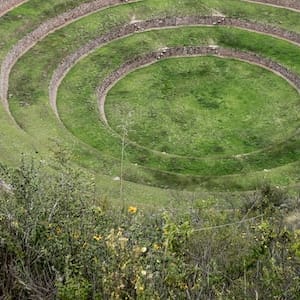rack and ruin: Idiom Meaning and Origin
What does ‘rack and ruin’ mean?
The idiom "rack and ruin" means to be in a state of complete destruction or collapse.

Idiom Explorer
The idiom "wrack and ruin" conveys the idea of complete destruction or extreme deterioration. It is often used to describe the state of something that has been severely damaged or ruined beyond repair. The phrase combines the words "wrack," meaning to wreck or destroy, and "ruin," meaning the state of being destroyed or in decay.
The idiom "run someone ragged" means to exhaust or wear someone out completely.
"Run rampant" is an idiom that means to spread or grow quickly and uncontrollably, often in a negative or destructive way.
The idiom "run into the ground" means to exhaust or use up completely, often through overuse or mismanagement.
The idiom "run amok" means to behave in a wild, uncontrollable or frenzied manner, often causing damage or harm.
The idiom "ruck up" means to gather or accumulate in a disorderly or untidy manner, often resulting in a mess or confusion. It can also refer to the wrinkling or bunching up of fabric or material. The phrase is often used to describe the act of causing disarray or untidiness.
The idiom "rock bottom" refers to the lowest possible point or level of something. It is often used to describe a situation or a person's life when they have hit a point of extreme difficulty or failure.
The idiom "rip to shreds" means to criticize or dismantle something or someone in a vehement and forceful manner.
Delving into Chaos
The idiom "rack and ruin" is commonly used in the English language to describe a state of extreme destruction and ruin. It is often used to highlight the severity of a situation or the extent of damage caused. This powerful expression has a long history dating back to the 17th century and continues to be widely used today.
One of the earliest recorded instances of the idiom "rack and ruin" can be found in John Milton's epic poem "Paradise Lost" published in 1667. In Book 2, Milton writes, "Anon out of the Earth a Fabrick huge/Rose like an Exhalation, with the sound/Of Dulcet Symphonies and Voices sweet." This passage highlights the concept of destruction and ruin through the use of the idiom.
The origin of the idiom can be traced back to two distinct sources. The word "rack" refers to a medieval torture device, consisting of a frame on which a victim's body was stretched. The association of "rack" with extreme pain, suffering, and destruction led to its incorporation into the idiom's meaning over time. The second part of the idiom, "ruin," is derived from the Latin word "ruina," meaning a collapse or downfall. Together, these words create a vivid picture of complete devastation.
When used in contemporary language, "rack and ruin" often denotes irreversible damage or destruction caused by neglect, carelessness, or a catastrophic event. It serves as a metaphorical expression to emphasize the grave consequences of such circumstances. The idiom's straightforwardness and vivid imagery leave little room for interpretation.
While "rack and ruin" has a well-established meaning, there are slight variations in its usage and interpretation. Some may use it broadly to describe any form of destruction or decay, while others reserve it for particularly catastrophic situations. Regardless, the core concept of devastation remains consistent.
An idiom closely related to "rack and ruin" is "wrack and ruin." This phrase carries a similar meaning and is often used interchangeably with "rack and ruin." Both expressions refer to a state of extreme destruction and ruin. "fall apart" is another idiom that aligns with the concept of "rack and ruin." It implies a complete disintegration or collapse, similar to the devastating effects described by the idiom.
"all to smash" is yet another related idiom that conveys the idea of complete and utter destruction. It emphasizes the shattering or breaking apart of something to the point where it is irreparable. Similarly, the idiom "run someone ragged" relates to the effects of neglect or exhaustion on an individual. It signifies the physical and mental strain that can cause a person to deteriorate or fall apart.
Lastly, the idiom "run into the ground" aligns with the concept of "rack and ruin." It suggests the continuous and excessive use or exploitation of something to the point where it is worn out or destroyed. This idiom emphasizes the detrimental consequences of overuse or mismanagement.
The idiom "rack and ruin" is a powerful expression that conveys the notion of extreme destruction and ruin. It has a long history within the English language and continues to be widely used today. The origin of the idiom can be traced back to the imagery of medieval torture devices and crumbling structures, which add to its impact and appeal. The related idioms "wrack and ruin," "fall apart," "all to smash," "run someone ragged," and "run into the ground" further emphasize the concept of devastation and its effects. Whether used broadly or in specific situations, the idiom "rack and ruin" effectively communicates the severity of a situation or extent of damage.
Example usage
- After neglecting his property for years, it had fallen into complete rack and ruin.
- The storm wreaked havoc on the small coastal town, leaving buildings in rack and ruin.
- The college dormitory, after years of student parties, was in a state of rack and ruin.
More "Destruction" idioms



